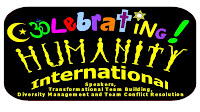
As the lift descended the two Zulu ladies made their observations of my well-rounded figure...
"Hawu! We sisi! Uwubonile umkhaba? (Gee Sister have you noticed the stomach.)
"Yebo, ngiwubonile. Yinkinsela yempela - sengathi inemali eningi!" (Yes, I have noticed it. Clearly a wealthy person - I'd imagine he has plenty of money)
All this gossip happened in front of me, as they innocently watched the floor indicator panel. I bided my time and as the two ladies prepared to leave the lift, I spoke to them in Zulu. "Sobuye sibonane bomama." (I will see you ladies around some time.)
"Hawu! Hawu!" They squealed in shock. "We didn’t know that you could speak Zulu!"
The event reminded me of similar events where people use their "superior" use of language to make negative observations of people.

Many years ago I used the services of a UK born dentist. I had an afternoon session with him. I had earlier washed my mouth out at a supermarket rest-room after eating a sandwich for lunch. It was not enough. He peered into my mouth and pronounced to his assistant, "It is a foggy day in Liverpool."
In his English way he had said that I had not brushed my teeth. I was very embarrassed and he lost me as a client and a number of others who I spoke to about the event.
In a recent training course my beautiful Hindu wife and I were subjected to abuse from a small group of England born delegates. In loud and profane tones they proceeded to malign the "Indians" and their "ability to speak the truth". This in the round about and sarcastic manner of certain English people. Very little is said directly.
We are however well travelled and understood perfectly. As facilitators we have to be fair, pleasant and respectful to all of our delegates. Any mention of their meanness would reduce the programme to a series of personal attacks. It took us both a lot of internal and interpersonal talk to get close to our normal warm level of communication.
At an earlier course three of the many Afrikaners, on a Celebrating Humanity© course, walked into the conference venue and made similar attacks on Arthie and the programme itself. This time it was in Afrikaans. They too never believed that we could understand and speak their language. Their embarrassment was very visible as the programme unfolded with both of us speaking English, Zulu and Afrikaans.
Numerous African people from our many language groups speak of the way certain English speaking South Africans "Shaya ‘ma angles." (To speak indirectly and in a round about way.) It is an old English habit to lighten the criticism and talk around a challenge, so as not to hurt feelings. Often the hurt is greater because no-one besides the speaker understands the true message until much later.
Some people find it necessary to joke in sexual manner. Their jokes are often below the belt and cause great embarrassment to their colleagues and friends who do not discuss these matters outside of their bedrooms. Most African and Eastern groups do not appreciate such jokes. Others try to get their laughs by bringing down "groups" of people. By race, by colour, by language, by religion and even by hair colour.
The message here is all about respect.
When we isolate ourselves into our common groups and use our cleverness to "secretly" or "publicly" attack others, we damage our ability to develop good working relationships. When we try not "to hurt others feelings", we often cause more pain than we would have by straight talk and without rancour. When we use our own "language" to communicate our jealousy or meanness towards those who communicate in other languages, we often isolate ourselves. When we joke in a manner that is sexual or which brings down other people, we bring ourselves, the listeners and our country down.
We live in a wonderful multi-lingual, multi-cultural and multi-spiritual land. All of our people have a right to respect and dignity. All of us have a duty to be respectful and dignified. One huge step of our journey, to a united land, will take place when begin to tell funny jokes that do not demean, or disrespect other people. And another gigantic step will take place when we talk straight, talk clearly and talk with respect.
Celebrating Humanity International
trainers@africa-dreams.com
24 April 2004










